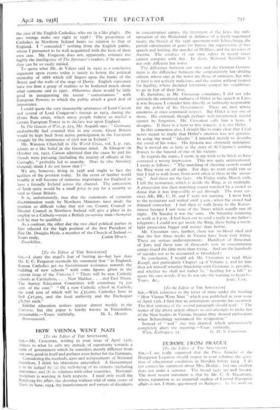HOW VIENNA WENT NAZI
• [To the Editor of THE SPECTATOR]
SIR,—Mr. Crossman, writing in your issue of April 15th, 3bjects to what he calls my attitude of superiority towards a form of government which he considers merely different from our own, good in itself and perhaps even better for the Germans.
Considering the methods, aims and achievements of National Socialism, I think his objections unjustified. A Government ts to be judged by (a) the well-being of its citizens (including minorities) and (b) its relations with other countries. National- Socialism is wanting in both respects. I need only recall the Reichstag fire affair, the shooting without trial of some scores of Nazis in Tune, 1934, the imprisonment and torture of dissidents in concentration camps, the treatment of the Jews. the mili- tarisation of the Rhineland in defiance of a freely-negotiated treaty, the breach of the 1936 agreement with Schuschnigg, the partial substitution of guns for butter, the suppression of free speech and writing, the murder of Dollfuss, and the invasion of Austria. The conduct of our own rulers in recent times cannot compare with this. In short, National Socialism is not only different but worse.
The difference between our own and the German Govern- ment is the difference between the comparatively law-abiding citizen, whose sins at the worst are those of omission, but who at least is not actively malicious, and the outlaw without respect for legality, whose declared intentions compel his neighbours to go in fear of their lives.
If, therefore, as Mr. Crossman complains, I did not take seriously the emotional outburst of Hitler in his speech at Linzi it was because I consider him directly or indirectly responsible for the policy of his Government. There are men whose emotions at once command respect. But Hitler is not one of them. His criminal, though perhaps well-intentioned, record cannot be forgotten. Mr. Crossman calls him a hero. I disagree. If there is a hero to this tragedy, it is not Hitler.
In this connexion also, I should like to make clear that I had never meant to imply that Hitler's emotion was not genuine. In using the word "falsetto " I intended merely to describe the sound of his voice. His hysteria was obviously unfeigned. But it moved me as little as the story of Al Capone's sending flowers to the funeral of one of his victims.
As regards the trams, I seem, in my wish to be brief, to have conveyed a wrong impression. This was quite unintentional. I wrote as follows : "The marching of cheering crowds round the Ring went on all night. For days no tram could run so that I had to walk home from work often at three in the morn- ing." And these are the facts. On Friday night, March it th, I left the restaurant, which is inside the Ring, at 12 midnight. A procession was then marching round watched by a crowd so dense that it was impossible to get through. The tram ser- vices AK, BK, C, D, and F were not running. I went back to the restaurant and waited until 3 a.m., when the crowd had thinned somewhat. I had then to walk home to the Kaiser- strasse because I saw none of the 'buses which usually run all night. On Sunday it was the same. On Saturday returning to work at 8 p.m. (I had been out to send a reply to my father's telegram), I could not get inside the Ring, there being a torch- light procession bigger and noisier than before.
Mr. Crossman says, further, there was no blood shed and that the last three weeks in Vienna have been very trying. These are serious understatements. Hundreds of thousands of Jews and those tens of thousands now in concentration camps found the time more than trying. And are the hundreds of suicides not to be accounted as bloodshed ?
In conclusion, I would ask Mr. Crossman to read Mein Kampf, and particularly Chapter 14 of Volume 2, and let him then ask himself whether friendship with Germany is possible, and whether we shall not rather be "heading for a fall," to quote his own words, if we do not take the warning to heart ?—


























































 Previous page
Previous page